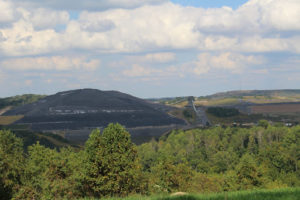Act 74 of 2019
Previously, PA’s Coal Refuse Disposal Control Act limited the temporary cessation of operations at coal refuse disposal sites to no more than 1 year. The Federal Surface Mine Conservation and Reclamation Act of 1977 (“SMCRA”) allowed for flexibility with temporary cessation status. Act 74 of 2019 amended Section 6.1 of the CRDCA to remove PA’s 1-year limitation and mandated that PA DEP promulgate rules or regulations that are consistent with the Federal rules on this subject.
What is a Coal Refuse Disposal Area (CRDA)?
A CRDA is an area that has been developed and permitted to dispose of coal waste. Coal refuse is any waste that results from the processing and cleaning of the coal, including slurry, culm, slate, clay, or other materials associated with or from a coal seam. After coal is mined, the raw coal must be processed and cleaned to prepare it for combustion. The first step is to put the raw coal through a series of shakers that separate rock material from the coal, creating a solid waste, generally called “coarse coal refuse.” The second step involves using chemicals that remove any other material from the coal and results in a liquid waste, generally called “coal slurry.”
There are several ways to manage coal refuse, but it is often put into massive piles called “gob piles,” resembling hills or mountains. Another standard method of managing coal refuse is to fill in valleys by building earthen dams on either side. Coarse coal refuse and slurry are dumped into the valleys, filling them to the top, creating new topographic features.

Proposed Changes
When a facility temporarily stops its operation for 30+ days, the proposed changes require the operator to provide the DEP notice of intent to stop its operation temporarily. The notice must include:
- The exact number of acres affected in the permit area
- A description of the extent and kind of reclamation of the areas
- Identification of the backfilling, regrading, revegetation, environmental monitoring, and water treatment activities that will continue during the temporary cessation status
- A description of the status of all operations that are a source of the coal refuse
When a facility temporarily stops its operation for 90+ days, the proposed changes require the operator to provide the DEP notice of intent to stop its operation temporarily. The notice must include:
- All the requirements listed above in the 30+ days’ notice
- Confirmation that the current bond under the permit is sufficient to complete the reclamation of the coal refuse area
- The timing of the installation of a phased system which will prevent precipitation from contacting the refuse
Notably, during any cessation of operations, the facility must maintain systems to protect surface and groundwater. The operator must follow all the applicable laws and requirements of the permit. Additionally, the DEP is given the authority to issue violations even if the facility has temporarily stopped its operation. If a facility’s permit expires while it is or plans to be idled, the facility must submit a permit renewal application 180 days before the current permit expires. Here, the permit remains active, and the operator may be required to conduct reclamation/stabilization activities consistent with the permit during the temporary cessation period.
Lastly, Act 74 provided the Department the authority to implement regulations that would oversee the connection of the coal refuse source (mining operation) to the coal refuse disposal area. In other words, if coal mining operation is temporarily shut down, it would be logical that coal waste production would also shut down and vice versa. Connecting the two operations is a commonsense update.
The Environmental Quality Board is accepting public comments on this proposed rulemaking until December 6, 2021. If you or anyone you know would like to submit a public comment or if you have any questions about the proposed changes, please reach out to Ethan Story at ethan@centerforcoalfieldjustice.org.

